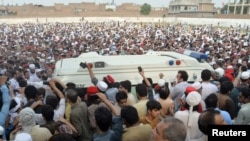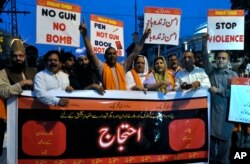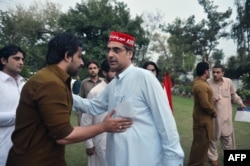The killing of Haroon Bilour, a prominent politician from Pakistan's Khyber Pakhtunkhwa province, has sparked a debate about the state's security measures and its ability to ensure the safety of politicians ahead of Pakistan general elections scheduled for this month.
Bilour, a provincial assembly candidate and a prominent leader of the secular Awami National Party (ANP), was killed Tuesday night when a suicide bomber blew himself up as Bilour was about to address an election rally in the northwestern city of Peshawar.
The blast killed 21 people and left more than 70 others wounded.
Tehreek-e-Taliban Pakistan (TTP), a U.S.-designated global terrorist organization, on Wednesday claimed responsibility for the attack.
Bilour's killing came a day after Pakistan's National Counter Terrorism Authority (NACTA), an entity that devises the country's counterterrorism strategies, issued an advisory to several politicians that militants could target them during election rallies and meetings.
Following Tuesday's attack, some experts were skeptical about the state's ability to provide security in large public rallies and gatherings.
"Bilour's killing is yet another security lapse, especially in light of the fact that NACTA had just released a warning that many top politicians are facing security threats," Jahangir Khattak, a New York-based political analyst, told VOA.
"It was the responsibility of the security establishment and intelligence apparatus to add new layers of security for all the main political faces of the prominent parties contesting elections who are under imminent threats," Khattak added.
Dr. Muhammad Taqi, a U.S.-based South Asia expert, echoed Khattak's concerns and added that attacks in election rallies undermine the government's claims of cracking down on militants in the country.
"The attack on Haroon Bilour is condemnable, and it also shows the threat against terrorism is very real and relevant. Haroon Bilour's father was also killed a few years back in a similar manner. So, where do we stand in the war against terror after six years?"
In 2012, Bashir Ahmad Bilour, Haroon's father and another active ANP leader, was killed in a suicide attack in Peshawar. The Pakistani Taliban claimed responsibility for the attack at the time, as well.
The Pakistani army contends there has been a significant decline in terrorism in Khyber Pakhtunkhwa since the military launched several operations that targeted and destroyed the terror group's hideouts, specifically in the tribal region bordering Afghanistan. But militants continue to carry out terror attacks in Khyber Pakhtunkhwa and other parts of the country.
Fair elections
Asfand Yaar Wali, president of the ANP, told reporters that Bilour's killing raised questions about the ability of the state to hold fair elections in the face of serious security threats.
"After this incident, how can one expect the elections will be free and fair?" he said. "The threat of terrorism is real in Khyber Pakhtunkhwa. The issue is that our enemy knows us, but we do not know them."
Security measures
The Election Commission of Pakistan (ECP) announced the postponement of the election at PK-78, Bilour's constituency, following Tuesday's terror attack.
Meanwhile, Major General Asif Ghafoor, Pakistan's military spokesperson, announced Tuesday during a press briefing that the military had plans to deploy more than 371,000 security forces to various polling stations across the country to ensure free, fair and transparent elections.
Ghafoor added that troops were being deployed at the request of the country's election commission.
VOA's Deewa service contributed to this report.







